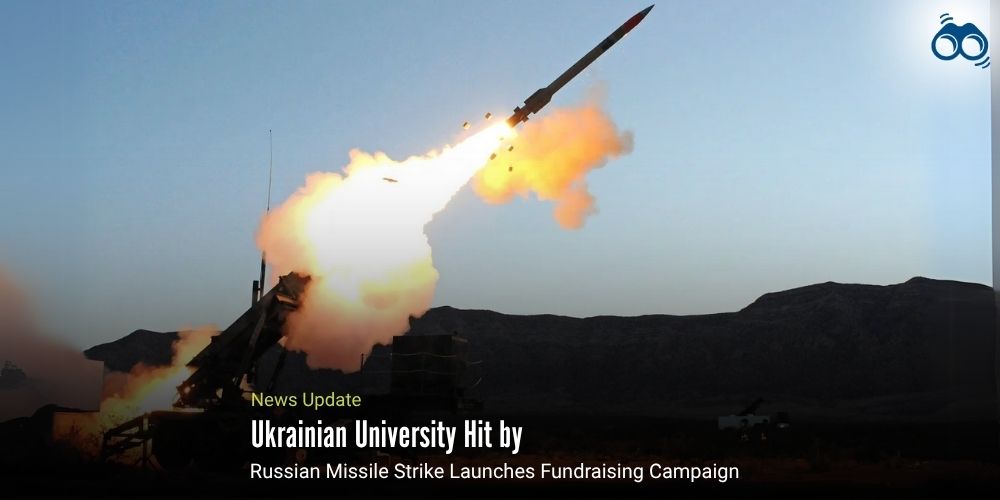Academic Resilience: Ukrainian University Pushes Forward Despite War
Education Under Threat: Sumy State University’s Fight for Survival
Sumy State University, a leading academic institution in eastern Ukraine, is set to launch an international fundraising campaign to restore its campus after a devastating missile strike in April. The attack caused significant damage, underscoring the tragic impact of the ongoing conflict. While the university seeks support for rebuilding, the renewed threat of advancing Russian forces, now reportedly just 25 kilometres away, has heightened the urgency of its efforts. The region, which was reclaimed by Ukrainian forces three years ago, is once again facing escalating instability.
Located near Ukraine’s eastern border with Russia, around 330 kilometres from Kyiv, the university suffered extensive destruction in the strikes, which claimed 35 lives, including two students, and left more than 100 injured. The head of the international affairs department, Alla Krasulia, emphasised that the damage was severe, with the building housing the Institute of Business, Economics and Management destroyed. She further noted that no equipment, furniture, or educational materials could be salvaged, highlighting the immediate need for reconstruction.
Despite these challenges, academic programmes and international research collaborations have continued. Rebuilding efforts are already underway, with partial repairs completed on the congress centre roof, which was also damaged in the bombing. In addition, approximately 290 cubic metres of debris have been cleared from the site. Vice-Rector for Scientific and Pedagogic Work, Ivan Kozii, stated that the university is actively seeking international grants to aid reconstruction. Given financial constraints, the administration is also looking at cost-saving measures, including improving energy efficiency and installing a solar power station.
Although the university currently has around 6,000 students, enrolment was significantly higher before the war. Kozii acknowledged growing concerns regarding safety and the future of education but reiterated the institution’s commitment to moving forward with the support of academic partners. Meanwhile, Krasulia pointed out that establishing an international fundraising channel has been challenging due to wartime financial regulations. Martial law restrictions have complicated foreign currency transfers and hindered international donations. To address this, the university has assembled a working group to navigate administrative obstacles and enhance donor engagement.
In parallel with fundraising, Sumy State University is exploring academic mobility schemes, allowing students and researchers to participate in training programmes and conferences abroad. Additionally, efforts are being made to strengthen its digital infrastructure, with European partners offering support for cloud-based storage to protect educational resources. Krasulia revealed that the university had received offers to help relocate digital resources to safer locations, especially after the destruction of the digital marketing laboratory during the bombing. The need for laboratory equipment and materials remains pressing. Liudmyla Ponomarova, head of the applied chemistry department, acknowledged that while essential tools are still available, additional resources are required to fully restore academic activity. More broadly, the ongoing war has had a profound impact on Ukrainian research, with government funding largely redirected towards military efforts.
Universities and research institutes increasingly rely on foreign aid to rebuild damaged infrastructure. A recent survey conducted by Ukraine’s National Research Foundation found that 26% of research institutions have reported considerable or severe damage since the conflict began in 2022. While most facilities remain operational, 12 are unable to function at full capacity. Furthermore, the survey indicated that the war continues to affect multiple aspects of Ukraine’s scientific system, including funding, staffing, and energy supply. Institutions are struggling to cover operational costs, maintain buildings, and finance research materials and training.
Although research funding has remained stable in nominal terms, inflation and rising energy and material costs have diminished its actual value. A European Commission report suggested that Ukraine must reform its research system to improve coordination and eliminate redundancies, ensuring greater efficiency in supporting long-term scientific development. As universities grapple with war-related disruptions, the resilience and determination of Sumy State University reflect the broader commitment of Ukraine’s academic institutions to rebuilding and advancing scientific progress.
Editor’s Note:
Sumy State University’s efforts to rebuild amid ongoing conflict highlight both resilience and the urgent need for international support. The missile strike that devastated its campus in April is a stark reminder of how the war continues to disrupt education and research across Ukraine. Despite these challenges, the university remains committed to its academic mission, sustaining programmes and clearing debris while seeking global assistance to restore its facilities. However, the difficulties of securing international donations, navigating wartime regulations, and maintaining research activity highlight the broader struggles faced by Ukraine’s scientific community. With government funding redirected toward defence, universities increasingly rely on foreign aid to rebuild and sustain operations.
Skoobuzz notes that as institutions adapt to these challenges, global academic collaboration and financial support will be critical to ensuring the continuity of higher education and research in Ukraine.














0 Comments (Please Login To Continue)